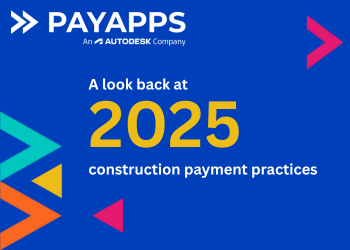Late payments in construction projects put the entire supply chain at risk. What is the solution to this chronic problem?
The UK construction industry is a major contributor to the UK economy, with £103 billion in economic output in 2014, 6.5% of the total. In 2015, 2.1 million jobs or 6.2% of the UK total were in the construction industry, according to Construction Industry: House of Commons Briefing Paper. The UK government sees the construction sector as fundamental to its Industrial Strategy for driving growth across the entire economy.3

Growth at serious risk
Many would applaud this. But we’re hearing alarm bells ringing, set off by one simple, niggling fact. Despite their fine reputations and enviable expertise, most UK firms have not as yet mastered the art of getting paid. Late payments in construction are so widespread and deeply entrenched that they represent a significant impediment to growth.
Recent research by BACS Payment Services revealed that a staggering 75% of UK businesses are forced to wait a month beyond their agreed contract terms before getting paid. Firms have said that this represents the biggest threat to their survival. With less working capital available to them, otherwise viable businesses end up folding. And it compounds the industry’s already critical skills shortage by driving talented specialists out of the market.
Late payments are everybody’s problem in construction
Late payments spread ill effects up and down the construction supply chain. They seriously hamper clients’ and contractors’ ability to deliver projects on schedule, to spec and within budget, and if they send a contractor to the wall, multiple projects can be put at risk. Relationships and reputations deteriorate, with the effect of compromising the tender process, as well as finance and creditworthiness. The ability to contract skilled contractors is also affected, and productivity can plummet.
Precisely because so many parties are impacted, it’s in everyone’s interest that payments are made without delay when they fall due. That makes payment administration a joint responsibility, and that starts with monthly payment applications and valuations, when all parties should be collaborating to provide and receive all the information needed.
A fragmented system
We’re all at fault in exacerbating this situation. Current practices are surprisingly manual. Contract parties each use their own independent procedures for preparation and assessment. It’s a highly inefficient and error-prone process, where fragmented systems result in a lack of visibility. Payment disputes and delays are a frequent outcome, mostly caused by missing or inaccurate documentation. The application for payment arrangements that we currently rely on are wholly unsuited to the increasing complexities of construction projects, and will not serve growing our industry into the future.
The benefits of collaboration
If all contract parties were able to work from the same system with the same data, many late payment bottlenecks would disappear. Digital technologies are key to achieving this. Already other construction processes are benefitting – BIM is a good example. With its ability to integrate, connect and automate, digital offers the potential to dramatically improve the efficiency of construction payment processes.
By taking advantage of cloud and mobile technologies, contract parties can manage payment processes collaboratively, using a single platform. Data only needs to be captured once, using pre-agreed formats and fields, making all necessary information available to all authorised parties from the start. This gives everyone visibility into the process, in real time from any location, eliminating the need for endless spreadsheet reconciliations, email trails and heated phone calls.
UK construction businesses currently spend an average of 130 hours per year, at an average cost of £1500 per business, chasing late construction payments. Debt caused by delays is attracting interest charges of £180 million. If these businesses were to switch to a collaborative cloud-based application for payment solution, the savings would foster growth and help achieve the industry’s vision of a more profitable future.
Takeaways
– The global construction industry is predicted to grow 70% by 2025, with UK construction in pole position to profit.
– The construction industry’s growth prospects are seriously compromised by the widespread problem of late payments.
– Late payments impact the entire supply chain and even multiple projects. They are everybody’s concern.
– Poor documentation and fragmented payment systems lie at the heart of the problem.
– A collaborative approach enabled by a single, secure cloud-based platform will dramatically improve the application for payment process.




